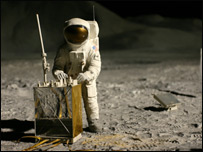 |
| Take Away English 随身英语 |
 |
|
“随身英语”,让你随时随地感受英国时尚生活,第一时间了解流行文化,并提供词汇、语音、语法及听力阅读练习,既方便在线学习,也可供随意下载。随身英语,学习英语新潮流! |
|
Return to the Moon 返回月球
[ 2006-08-30 08:00 ]
 在线收听短文 在线收听短文
 |
| An astronaut stands on the surface of the
Moon |
Scientists in the UK have expressed their enthusiasm for
China’s plans to explore the Moon with robotic spacecraft, and
are keen to take part
in the adventure.
British scientists are
seeking to collaborate with their Chinese
counterparts on the Cheng’e programme. This four-phase
programme could see the return of astronauts
to the moon’s surface for
the first time since the Apollo 17 mission in 1972.
Ties between the Chinese and UK space
community have been strengthened since a visit to China made by a team of
British academics, agency officials, and space scientists
earlier this year. At that time discussions took place regarding the UK building
scientific instruments for the second phase of China’s
lunar missions
.
One British academic who participated in the discussions, Professor John
Zarnecki of the Open University said, "I think they are looking for significant
collaboration. They have got good technology themselves but they will admit that
they are fairly new in space science; so they don't have all of the instrument
capabilities and so on."
China has already established itself as the third space
superpower, having successfully launched two manned
spaceflights – last year two Chinese astronauts spent five days
in orbit before safely returning to Earth. But China’s space
ambitions don’t stop there. As well as a lunar landing, plans
are being made to set up a permanent space station
.
The UK, on the other hand, has had a more modest space
programme. Only a handful of Britons have broken free
of the Earth’s atmosphere. Most recently,
UK-born astronaut, Piers Sellers, spent thirteen days on board the American
space shuttle Discovery.
However, British space exploration has not always gone
according to plan. The Beagle 2 probe to Mars
disappeared without a trace
on Christmas Day 2003.
GLOSSARY 词汇表 (收听发音, 请单击英语单词)
 下载相关辅导材料(PDF格式) 下载相关辅导材料(PDF格式)
下载材料中不仅包括阅读,词汇,语法等练习,还有单词搜索等游戏。帮助你英语读写能力,了解相关的背景知识和语言环境。
|